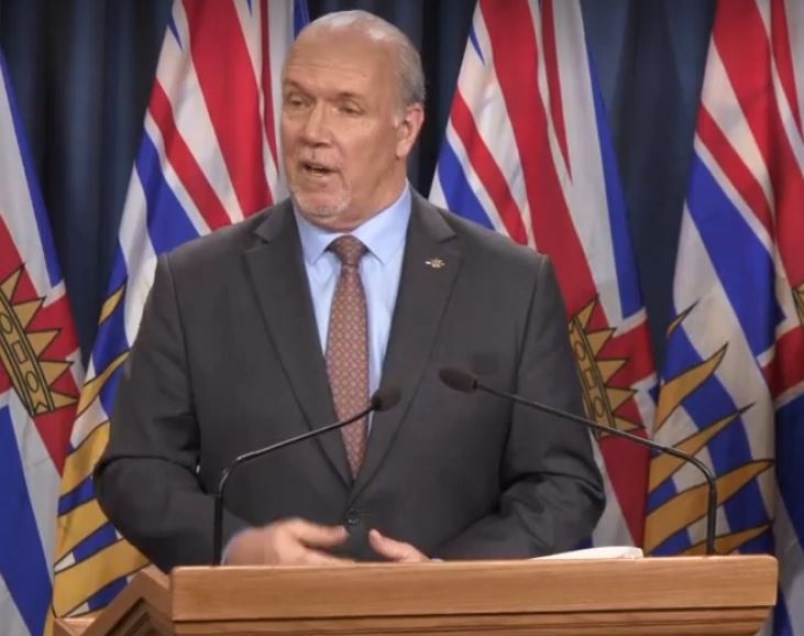British Columbians will likely be able to double the amount of interpersonal contact they're having now, while keeping new cases of COVID-19 at a manageable level, provincial health officer Dr. Bonnie Henry said on Monday.
Premier John Horgan is expected to address the province on Wednesday to announce what public health measures will be relaxed and what the timeline looks like. However, Henry said, British Columbians shouldn't expect a return to normal soon.
"Our goal in the next month is to learn how we can live with this virus. This year, with so much unknowns, will be unusual," Henry said. "This is going to be a unique summer for all of us."
The current social distancing measures in place in B.C. have effectively reduced interpersonal contact to about 30 per cent of normal, Henry said.
"Since we've put in control measures in March... we have had a dramatic and sustained decrease in cases. (But) every community in our province has some some brush with COVID-19," Henry said. "On most days of the year, 111 people (in B.C.) died from all causes. We have had about 170 excess deaths since March. This outbreak has had a population effect."
Modelling predictions released by the province on Monday show an increase to 40 per cent social contact would have little impact on new cases in the province. An increase to 60 per cent of normal social contact would likely result in a small rise in cases, Henry said, but at a level the healthcare system will be able to cope with. However, increasing contact beyond that could allow COVID-19 to start spreading exponentially in the community.
"Our challenge and our work together is to find that sweet spot. The things that we are thinking about is how we can increase connections with people or have safer connections with people. How can we lift the restrictions on restaurants and pubs, while still maintaining that social distance?" Henry said. "We know we have some room to increase our contacts – increase our contacts at work and school."
Some of the measures put in place at businesses offering essential services, like grocery stores, are an example of how the province can move forward, she said. Measures like limiting the number of people in stores, physical barriers to reduce contact, using protection like masks when close contact can't be avoided, and increasing testing and contact tracing to locate and stop outbreaks immediately are things they are looking at.
"Staying at home from work or school if you're ill, this needs to be the new normal forever," Henry said.
However, she said, the limit on gatherings larger than 50 people isn't something that likely to be lifted anytime soon.
"Smaller is better. Outside is better than inside. We can do Little League baseball, for example, but it will look different this summer," she said. "I do not think we'll be doing this forever. We'll know more in the fall if we're going to have a natural upsurge during respiratory illness season."
As people increase their contacts, they will have to be mindful and protect the people in their lives who are most vulnerable, Henry said. Data has shown men, people over 50 and people with chronic health conditions are the greatest risk of being hospitalized or dying from COVID-19.
Health Minister Adrian Dix said the pandemic has challenged everyone, and returning to normal too soon would undo the sacrifices everyone has made to control the spread of COVID-19.
"COVID-19 has forced us to make some very difficult decisions – actions we've not had to take in our lifetime. We must continue to stop the spread, while getting to a new normal," Dix said. "Getting to this point has been difficult. The costs have been high, and higher for some. This will be a different summer than any of us have ever known, but it can be a summer of renewal in B.C."
NEW CASES IN THE NORTH
In addition to unveiling the modelling projections, Henry and Dix provided the usual daily update on COVID-19 cases in the province.
Since Saturday, there have been two new cases in the Northern Health region, bringing the total since the start of the pandemic to 52. Across the province, a total of 53 new cases were reported, bringing the B.C. total of 2,224.
As of Monday, 77 people across B.C. were hospitalized from COVID-19, including 20 in critical care. Three more people died from the disease since the last update on Saturday, bringing the provincial death toll from the pandemic to 117.
Across the province, 1,417 people had fully recovered from COVID-19.
The B.C. Centre for Disease Control reported on Saturday that three people in Northern Health were hospitalized from COVID-19, including one in critical care, and 42 people had fully recovered in the north.



